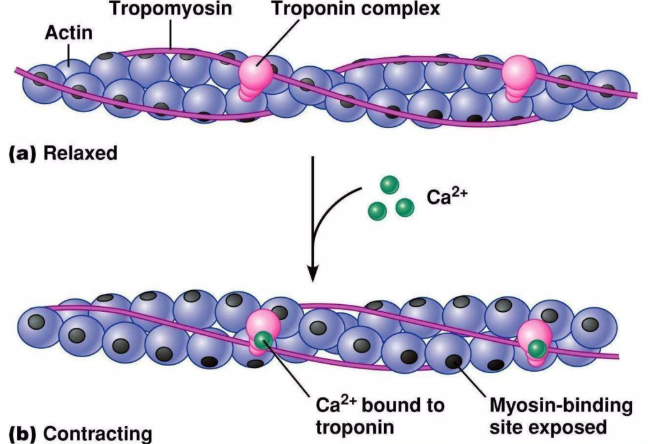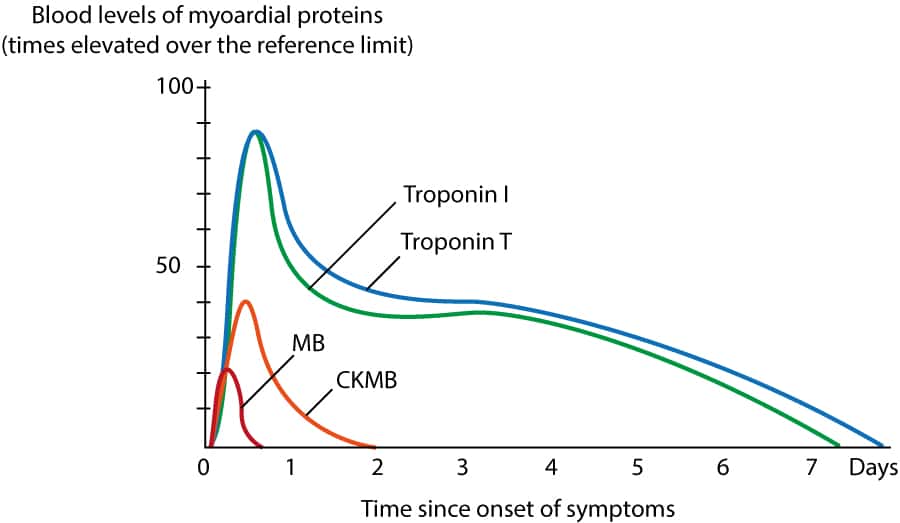Makindo Medical Notes"One small step for man, one large step for Makindo" |
|
|---|---|
| Download all this content in the Apps now Android App and Apple iPhone/Pad App | |
| MEDICAL DISCLAIMER: The contents are under continuing development and improvements and despite all efforts may contain errors of omission or fact. This is not to be used for the assessment, diagnosis, or management of patients. It should not be regarded as medical advice by healthcare workers or laypeople. It is for educational purposes only. Please adhere to your local protocols. Use the BNF for drug information. If you are unwell please seek urgent healthcare advice. If you do not accept this then please do not use the website. Makindo Ltd. |
Cardiac Troponins
-
| About | Anaesthetics and Critical Care | Anatomy | Biochemistry | Cardiology | Clinical Cases | CompSci | Crib | Dermatology | Differentials | Drugs | ENT | Electrocardiogram | Embryology | Emergency Medicine | Endocrinology | Ethics | Foundation Doctors | Gastroenterology | General Information | General Practice | Genetics | Geriatric Medicine | Guidelines | Haematology | Hepatology | Immunology | Infectious Diseases | Infographic | Investigations | Lists | Microbiology | Miscellaneous | Nephrology | Neuroanatomy | Neurology | Nutrition | OSCE | Obstetrics Gynaecology | Oncology | Ophthalmology | Oral Medicine and Dentistry | Paediatrics | Palliative | Pathology | Pharmacology | Physiology | Procedures | Psychiatry | Radiology | Respiratory | Resuscitation | Rheumatology | Statistics and Research | Stroke | Surgery | Toxicology | Trauma and Orthopaedics | Twitter | Urology
Related Subjects: |Cardiac Troponins |Coronary Artery Anatomy and Physiology
Troponins are a group of proteins found in skeletal and cardiac muscle fibers that play a crucial role in muscle contraction. They are integral to the regulation of the interaction between actin and myosin, the contractile proteins of muscle. There are three types of troponins: troponin C (TnC), troponin I (TnI), and troponin T (TnT). Cardiac-specific forms of TnI and TnT are highly sensitive and specific biomarkers for cardiac muscle injury.
Structure and Function

- Troponin C (TnC) :
- Troponin C binds calcium ions, which induces a conformational change that allows for the interaction of actin and myosin, leading to muscle contraction.
- TnC is similar in both cardiac and skeletal muscles.
- Troponin I (TnI) :
- Troponin I inhibits the ATPase activity of actomyosin, thus regulating muscle contraction.
- There are cardiac-specific isoforms of TnI that are used as biomarkers for cardiac injury.
- Troponin T (TnT) :
- Troponin T binds to tropomyosin, anchoring the troponin complex to the thin filament of the muscle fiber.
- Cardiac-specific isoforms of TnT are also used as biomarkers for cardiac injury.
Role in Muscle Contraction
- The troponin complex, along with tropomyosin, regulates the interaction between actin and myosin, the proteins responsible for muscle contraction.
- In the relaxed state, tropomyosin blocks the myosin-binding sites on actin filaments.
- Upon calcium binding to TnC, a conformational change occurs, moving tropomyosin away from the binding sites on actin.
- This exposure allows myosin heads to bind to actin, initiating the cross-bridge cycle and resulting in muscle contraction.
Clinical Significance

- Cardiac Biomarkers :
- Cardiac-specific troponins (cTnI and cTnT) are released into the bloodstream when cardiac muscle is damaged.
- Elevated levels of these troponins are highly sensitive and specific indicators of myocardial injury, such as in acute myocardial infarction (AMI).
- Diagnosis of Myocardial Infarction :
- Measurement of cTnI and cTnT levels is a critical component in the diagnosis of AMI.
- Troponin levels typically rise within 3-6 hours of myocardial injury, peak at 12-24 hours, and can remain elevated for 7-10 days.
- Other Conditions :
- In addition to AMI, elevated troponin levels can be seen in other conditions such as myocarditis, heart failure, pulmonary embolism, and renal failure.
- However, the presence of elevated troponin levels should be interpreted in the clinical context, as they indicate myocardial injury but not necessarily myocardial infarction.
Interpretation of Troponin Levels
- Acute Myocardial Infarction :
- A significant rise and/or fall in troponin levels, in the context of symptoms of ischaemia, ECG changes, or imaging evidence of new loss of viable myocardium, confirms the diagnosis of AMI.
- Chronic Elevated Troponin :
- Persistently elevated troponin levels without a significant change over time may indicate chronic myocardial injury, such as in chronic heart failure or stable coronary artery disease.
Summary
Troponins are essential regulatory proteins in muscle contraction, with cardiac-specific isoforms (cTnI and cTnT) serving as critical biomarkers for cardiac injury. Their measurement is vital in the diagnosis and management of acute myocardial infarction and other conditions involving myocardial damage. Understanding the structure, function, and clinical significance of troponins is crucial for effective patient care in cardiovascular medicine.